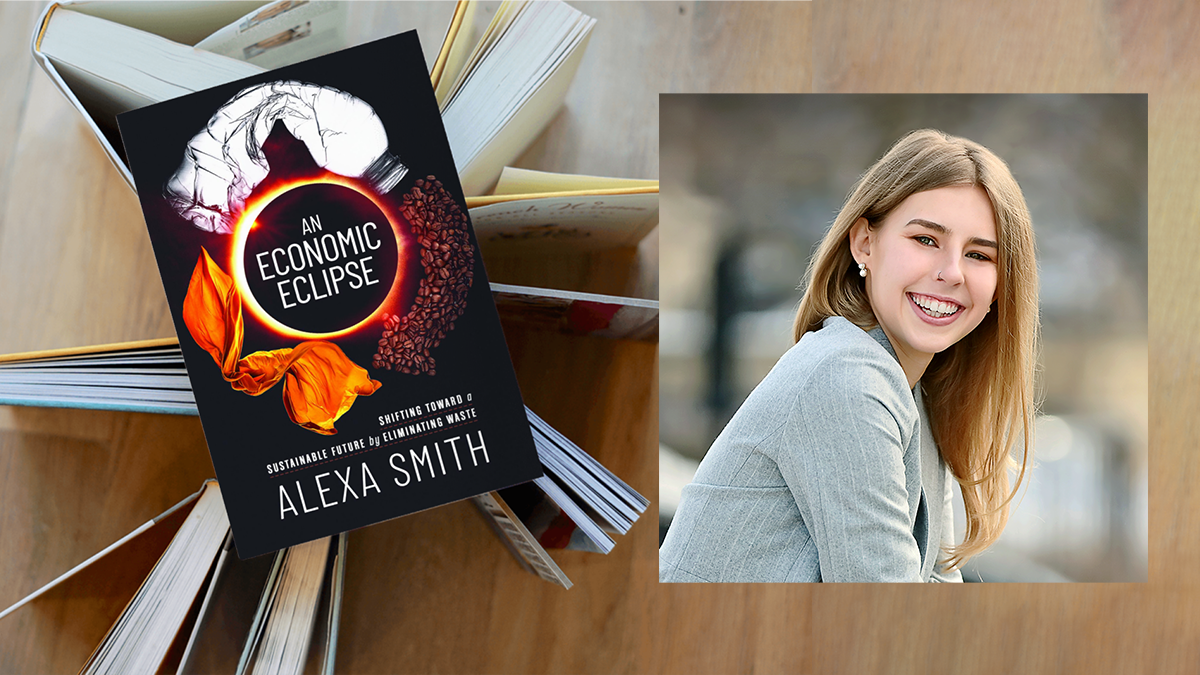While the rest of us were watching Tiger King last spring, University of Illinois senior in environmental science Alexa Smith was working on her first manuscript. She published it in April of this year.
The book is called An Economic Eclipse: Shifting Toward a Sustainable Future and argues for a zero-waste lifestyle and a “circular economy.” Essentially, that means reusing and recycling as many things as possible instead of throwing them out, while asking big companies to do the same.
The circular economy has been the premise of a major international zero-waste movement since the early 2000s. Its supporters say that sustainability is the job of everyone and that there are ways to make the process of creating and consuming goods better for the environment.
In her book, Smith discusses industries from textiles to waste management, showing how each can play its part in making products more sustainable, or ensuring the things we have today last. She says regular people can help by reusing and recycling the things they buy as much as possible.
Smith said she started writing the book around Earth Day last year, after watching a TED Talk by environmental activist Lauren Singer. Smith called her the “poster child” of the zero-waste movement.
“She showed how she was able to store one year’s worth of trash in a mason jar,” said Smith “To me that was super profound. I started wondering how much waste I produce.”
The title, An Economic Eclipse, alludes to the window of opportunity available to society to shift toward a more sustainable circular economy and prevent the worst effects of pollution and waste mismanagement.
The project started when Smith came home from studying abroad and started looking for summer opportunities. She happened across a fellowship program with Georgetown University.
“A lot of my plans fell through because of the pandemic,” said Smith. “So, I was like, hey, let’s write a book instead!”
Smith said she was motivated by the pandemic. The promise of something to keep her busy when she couldn’t do much outside her house was what kept her going through the lockdown.
She said she’s always been passionate about the environment, originally entering the University of Illinois in biological engineering. Over time learned that she loved the activism and “people side” more than solving technical problems.
Traveling and experiencing nature is what sparked Smith’s interest in environmentalism from an early age. She said a visit to Indonesia, where she said the ways that people lived with nature rather than separate from it convinced her that there was a better life possible back home in the states.
“I didn’t really consider it as a possible career path until my junior year of high school,” said Smith. “That’s when I took an environmental science class that really started me on my path.”
Through the fellowship, she was able to meet lots of other young authors. She said that networking helped her feel more comfortable with the barriers she faced in writing.
“Hearing that they were going through the same struggles that I was going through… that was such a unique experience because a lot of authors probably don’t know other authors,” said Smith. “That was definitely something that pushed me through.”
Smith also said she grappled with lots of self-doubt about her skills and accomplishments while writing and even after publishing her book. As a 20-year-old author, she wondered whether people would listen to her and trust her knowledge.
But Smith is truly passionate about her research. She devoted her entire junior year to her book. She said the nine months she worked on it are just a blur because so much of her time was spent researching, writing, and revising.
“This is probably not good advice, but I honestly prioritized my book over my studies,” said Smith. “I felt like this is something I’m extremely passionate about and I can see being a major part of my future.”
Smith also has some big fans. She wrote every week and sent out newsletters to people who wanted to follow her progress and were excited about the book. She said older people in her life look up to her as someone who inspires them.
“One person that comes to mind is my aunt,” said Smith. “She responded to every email and asked about how I got connected with my publisher and recommendations on getting started writing. She’s wanted to write her own book her entire life and that’s so weird, like, my aunt came to me for career advice?”
Overall, Smith said writing her book helped her identify her career goals and what her future should be. She said every week she would look back and see how much had changed, not just on the page, but also about herself.
An Economic Eclipse: Shifting Toward a Sustainable Future by Alexa Smith is available at major book retailers.








